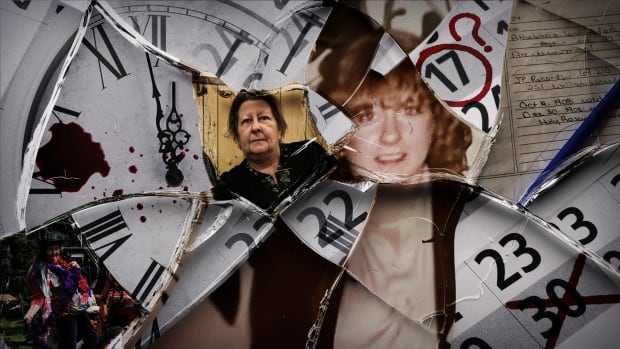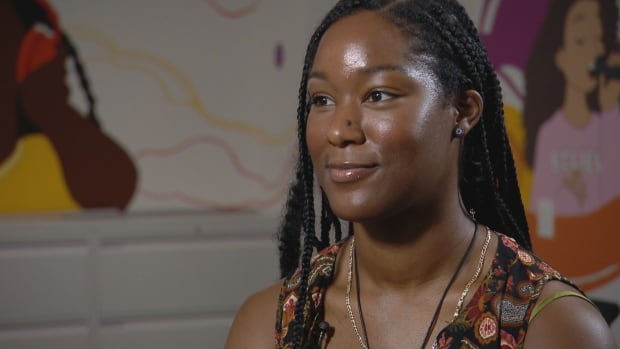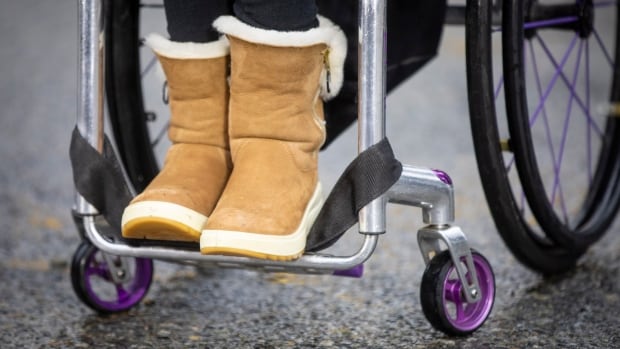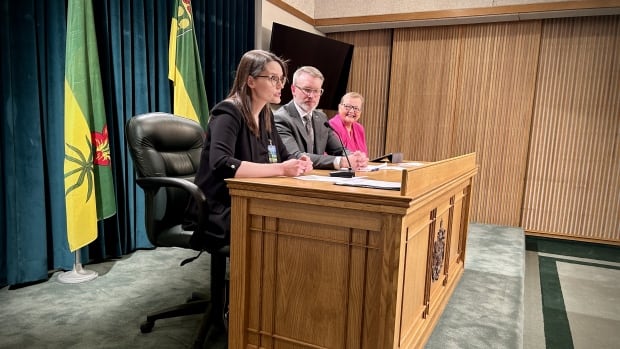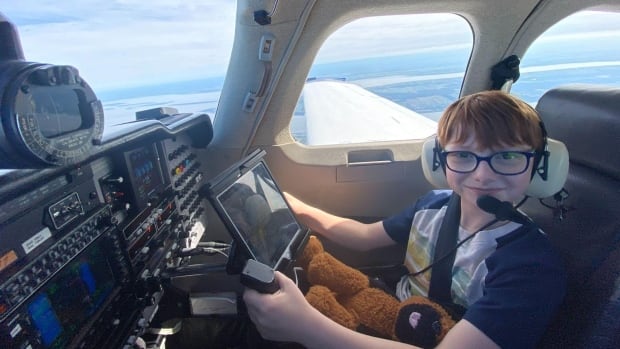This First Person column is written by Sheila Willis, who lives in the northern Alberta hamlet of Smith. For more information about CBC’s First Person stories, please see the FAQ.
It was my granddaughter’s third birthday. There were bouncy castles, balloons, a cake. Kids playing, laughing, screaming. Hugs and kisses from a multitude of family members.
Except me.
As I looked at the pictures on Facebook, I could see my granddaughter’s smile and the light in her eyes as she opened presents and I realized I had missed another milestone. My brain injury has stolen my sense of time — and so much more.
My internal calendar has been out of whack since my early 20s when a guy who thought I was someone else hit me over the head with a baseball bat. I lived in Edmonton at the time, and was young, wild and free. I’d gone to a house party with my boyfriend and another guy. I was barely through the door when I was hit, resulting in a compressed fracture of the skull.

I didn’t go to the hospital. My family rarely did when I was growing up so even though I was bleeding profusely and throwing up, it didn’t even occur to me to get medical attention. Instead I laid on my couch and slept.
I came around to the smell of rotting meat. I had taken a turkey out for Thanksgiving (or maybe it was Christmas) and it had spoiled on the counter. It was obvious that I had been out of it for days.
It was my first but not last experience of losing time.
Two weeks at a time
I live life in a two-week window. I keep time, not by date but by order of events. In this case, I had mixed up my husband’s and granddaughter’s birthdays. Her party was before his but I had placed it afterward in my lineup of things to do.
It’s not easy to explain.
Imagine being dealt an endless deck of cards, with each card being a personal or professional activity. At any time, the dealer can give you more cards, sometimes one, sometimes a whole bunch.
Most people are born with an internal calendar where, as each card is received, it’s put in the correct spot on a revolving board. But my internal calendar was destroyed by my brain injury.

Instead of keeping my cards on a neat board, my stack looks like 52 Pickup. I rifle through a jumbled pile, looking for the next cards to be played. When I’m done with a card, it goes into a box where I forget about it because I’m busy trying to find the next cards to play. If someone asks me about a past event, I shuffle through my box looking for cards that trigger a memory. Sometimes I can find what I’m looking for; other times I can’t.
I have some association strategies that I use. For example, I was married on the sixth day of the sixth month. In order to confirm the year, I have to look at time-stamped photographs of our wedding. My son and his daughter were both born on the 22nd. What months? I need to ask someone.
There have been countless occasions when I’ve been asked my age. My response is to ask what year it is and then subtract my birth year to answer the question.
Headaches, mixed words
Forty years after the injury, I still suffer a host of other symptoms.
I don’t sleep well. I live with near-constant headaches — some a dull ache, others incapacitating. What I call a headache can be a full body experience that alters my sense of my physical self. I feel like I am walking beside myself, with what I call marshmallow head or body. I can’t feel where my skin ends and the air begins.
I often mix up my words. They don’t come out in the right order, or I say the opposite of what I mean, such as, “Put that in the oven” when I want it to go in the refrigerator.
The brain’s role in keeping time
Humans have used clocks and calendars to keep track of time since early civilizations but only recently have researchers made inroads in understanding how our brains make sense of time.
In the last decade or so, scientists have found that there isn’t a single timekeeping mechanism but a complex combination of factors. A 2021 study from neuroscientists at MIT said that part of the timekeeping process involves the memory of an event as well as the context, including time and location. The researchers believe these episodic memories — recording the what, where and when of experiences — allow us to engage in mental time travel.
A traumatic head injury could damage parts of the brain that control working memory, self control and forward-thinking, which would result in problems with memory, judgment, abstract concepts and sense of time and space.
On some days, I have a hard time figuring out what time I should leave home to get to an appointment. I have been an hour late and I have been an hour early. This presents its own set of challenges in personal and professional relationships.
My husband was aware of the injury, and many of its side effects, when we married. He is a handyman and can repair a multitude of things. He once told me that it made him angry that he couldn’t fix my headaches.
My adult life has been spent going to doctors to deal with the headaches and other symptoms. In my mid-40s, my memory loss was taking a turn for the worse so I went to my family doctor and asked for an Alzheimer’s test. He tested me for memory impairment, thinking skills and other functional abilities. There was no indication I had Alzheimer’s and he told me to take it easier.

About five years later, my memory got even worse. When shopping, I would buy the same item over and over, with no recollection of the prior purchases. My husband and I developed a strategy that if I saw something that was not on my list to buy, I would call him and ask if I had purchased it already. He does that to this day. It was around then that I went to a neuropsychiatrist, who diagnosed me with post-concussive syndrome, which at the time was a relatively new diagnosis.
While my husband helps me when he can, he often works away and isn’t there to assist with day-to-day planning. Medication gives me a better sense of time and recall, but a rested brain is the most important thing I can do to alleviate symptoms.

My daily naps aren’t a luxury; without them my quality of life decreases and I am a shell of a person. I have a hard time following conversations, so I isolate myself to avoid stress which can bring on additional symptoms. I lose track of what I am doing, while some tasks are so unmanageable I simply don’t. Leaving tasks for another day can add to the burden of trying to keep some semblance of order. Quite simply, a daily nap reduces my symptoms which lets me have the time of my life.
Recently, I double-checked the dates of events that were coming up.
On the second Saturday of each month, I do an interactive presentation telling stories about Alberta’s past. I also had plans to take my pre-teen granddaughter to a Ham and Turkey bingo at the local seniors’ centre.
The first human patient has received an implant from Neuralink, Elon Musk’s computer-brain interface company. Andrew Chang explores the complexity of the N1 implant, how it’s working in clinical trials, and what Neuralink is trying to achieve with the device.
I thought bingo was the day after my presentation but when I checked I realized it was really the Tuesday before. Not only did I need to change my mental lineup of events, but also the calendar on my phone. Whatever glitch happened, it was across the board.
As my grandchildren grow up, it will become easier to explain to them why Grandma missed some of the important days. It is not something that is easily understood, even by adults. I can only hope they will understand.
Do you have a compelling personal story that can bring understanding or help others? We want to hear from you. Here’s more info on how to pitch to us.
